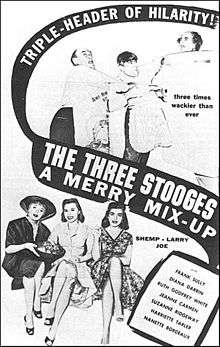A Merry Mix Up
| A Merry Mix-Up | |
|---|---|
 Columbia Pictures made an error by listing the Stooges as "Shemp (who had died), Larry and Joe," omitting Moe entirely. | |
| Directed by | Jules White |
| Produced by | Jules White |
| Written by | Felix Adler |
| Starring |
Moe Howard Larry Fine Joe Besser Nanette Bordeaux Jeanne Carmen Ruth Godfrey White Suzanne Ridgeway Harriette Tarler Diana Darrin Frank Sully |
| Cinematography | Irving Lippman |
| Edited by | Harold White |
| Distributed by | Columbia Pictures |
Release date |
|
Running time | 15:51 |
| Country | United States |
| Language | English |
A Merry Mix-Up is the 177th short film released by Columbia Pictures in 1957 starring American slapstick comedy team The Three Stooges (Moe Howard, Larry Fine and Joe Besser). The comedians released 190 short films for the studio between 1934 and 1959.
Plot
The Stooges play three sets of identical triplets, born one year apart. All nine brothers lose track of each other after World War II, unaware that they are all living in the same city. One set (Moe, Larry and Joe) is single, one (Max, Louie and Jack) is married, and the other (Morris, Luke and Jeff) is engaged.
Trouble brews when the engaged set of brothers decided to celebrate at a local nightclub. Before they arrive, the unmarried set show up, followed by the fiancees of their brothers. The ladies start hugging and kissing the unsuspecting brothers. Within minutes, the wives of the married brothers show up, thinking their husbands are cheating on them. Hilarity ensues when the nightclub waiter (Frank Sully) walks in and sees all nine brothers simultaneously.
Production notes
A Merry Mix-Up is a remake of Laurel and Hardy's 1936 feature film Our Relations. Felix Adler provided the screenplay for both films.[1]
The closing matte shot featuring all nine brothers standing side by side took careful planning to expose perfectly, giving the effect of three Moes, Larrys and Joes. To achieve this, each Stooge had to stand behind a specific marker before each shot was taken. For the final exposure, director Jules White suspected that Larry Fine was standing behind the wrong marker when compared to the previous two exposures. Larry knew White was wrong, and went to great lengths to prove it. Luckily, Larry prevailed, and saved the studio from having to refilm thousands of dollars worth of exposures.[1]